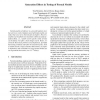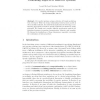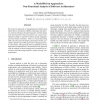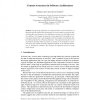120
click to vote
ISSRE
2002
IEEE
15 years 7 months ago
2002
IEEE
Formal analysis of software is a powerful analysis tool, but can be too costly. Random search of formal models can reduce that cost, but is theoretically incomplete. However, rand...
133
Voted
FM
2003
Springer
15 years 8 months ago
2003
Springer
Incomplete, inaccurate, ambiguous, and volatile requirements have plagued the software industry since its inception. The convergence of model-based development and formal methods o...
87
Voted
ERSHOV
2003
Springer
15 years 8 months ago
2003
Springer
For reactive systems, a large collection of formal models has been developed. While the formal relationship between those models is often carefully analyzed, the methodical implica...
131
Voted
KBSE
2003
IEEE
15 years 8 months ago
2003
IEEE
We present an approach to managing formal models using Model Driven Architecture (MDA) technologies that delivers analysis techniques through integration with the design tools and...
111
click to vote
EWSA
2005
Springer
15 years 8 months ago
2005
Springer
The growing importance of context-awareness in the construction of adaptable systems requires the development of formal models and notations that can bring this new dimension from ...
133
Voted
ER
2005
Springer
15 years 8 months ago
2005
Springer
This paper presents the Kuaba Ontology, a knowledge representation model for Design Rationale described in an ontology definition language. The representation of this model in a sp...
107
click to vote
ECBS
2006
IEEE
15 years 8 months ago
2006
IEEE
The Adviser Portal (AP) is a new IT system for 15 Danish banks. The main goal of AP is to increase the efficiency and quality of bank advisers’ work. Requirements engineering fo...
111
click to vote
GECCO
2007
Springer
15 years 8 months ago
2007
Springer
Considering the available body of literature on continuous EDAs, one must state that many important questions are still unanswered, e.g.: How do continuous EDAs really work, and h...
121
Voted
B
2007
Springer
15 years 9 months ago
2007
Springer
Abstract. Writing a formal specification for real-life, industrial problems is a difficult and error prone task, even for experts in formal methods. In the process of specifying a...
146
click to vote
AH
2008
Springer
15 years 9 months ago
2008
Springer
The focus of my thesis is on the development of a multi-method framework for the validation of formal models (domain model, user model, and teaching model) for adaptive work-integr...




